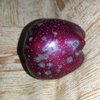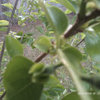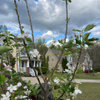Ericoid Mycorrhizal Fungus For Blueberries?
Has anyone tried adding ericoid mycorrhizal fungi to their blueberries? I've read that blueberries require a symbiotic relationship with these fungi (in their roots) in order to really thrive. Has anyone tried this? I have no way to know if my soil already contains this family of fungi or not.
I found one etailer who Ericoid Mycorrhizae for $37/8oz, and was wondering if it is worth it.
http://hydrobuilder.com/myco-edge-ericoid-mycorrhizal-blend-8-oz.html
This post was edited by powerofpi on Mon, Jun 9, 14 at 17:56
Comments (24)
pharmachad
9 years agoJust dig up some dirt around the roots of an established
Flourishing bush and Bingo you saved 37 bucks!charina
9 years agoI'll be able to give some data on it in a year or two. I planted 27 blueberries this year in pots. I have multiple of most varieties, and I innoculated one or two of any given variety, and left the other one of two without added inoculation. E.g. One emerald is inoculated, one is not. Two cara's choice are inoculated, one is not. Measurements were taken at time of planting, and are due to be updated now. Was hoping to do monthly measurements, but not enough time in the evenings as of late.
My hypothesis is that there won't be much difference between inoculated and non. I suspect that the advantage of myco comes when nutrients are scarce. I suspect that in a fertilized pot culture, bb roots are able to obtain all they need without the fungus symbiosis. This has been borne out with other species studied, which showed advantages in conditions of moisture or nutrient deficiencies, but little or no advantage in optimal conditions.
I didn't go so far as to sterilize my potting mix to ensure no fungi were present. So it's a limited test of the effects of supplemental inoculation.
Related Professionals
Walnut Landscape Architects & Landscape Designers · Frisco Landscape Contractors · Goodyear Landscape Contractors · Aberdeen Landscape Contractors · Bedford Landscape Contractors · Berkley Landscape Contractors · Burien Landscape Contractors · Concord Landscape Contractors · Federal Way Landscape Contractors · Marlborough Landscape Contractors · Mastic Beach Landscape Contractors · Nashua Landscape Contractors · The Woodlands Landscape Contractors · Wailuku Landscape Contractors · Westchester Landscape Contractorsalan haigh
9 years agoFrom previous studies I've seen I suspect this is another version of horticultural snake oil. Stick to university based recs on this- if this product actually made a significant difference the industry would be all over it.
I also agree that any possible benefit could probably be duplicated by watering in a couple handfuls of dirt obtained near established and healthy plants.
drew51 SE MI Z5b/6a
9 years ago"if this product actually made a significant difference the industry would be all over it. "
When i first looked for this fungi for blueberries, the only kind available was commercial. Like 50 pound bags. The fungi is sold commercially.
powerofpi
Original Author9 years agoGreat input from everyone, thanks. For now I'm going to do nothing and just hope my soil happens to contain ericoid mycorrhizae until I can find an established and flourishing bush.
charina, I'm very interested to hear the results of your experiment! You're right to worry that the non-innoculated pots might already have fungi in them. I also wonder if there's a way the inoculated ones might colonize nearby pots? In any case, I think many people would like to hear a followup to your experience.
charina
9 years agoI'm not expectant that the non-inoculated pots will have the requisite fungi. There are no native ericoid plants within 500 miles that I am aware of, and what little I have read on the presence of the fungi that are part of an ericoid mycorrhizae do not persist long without a host plant. I'm not sure what spore longevity or transport might be like. I need to read up more on that. Time is short, so it'll have to wait until winter.
I haven't taken any extraordinary steps to prevent cross contamination, other than to be sure to plant the non-inoculated prior to inoculating and planting the other plants. But the pots are close together, in part of facilitate as identical of treatment as I can, and that may lead to the fungi crossing to the non-inoculated plants even if not present in the bark mix initially. (I didn't use any peat that might contain the fungi or it's spores - only locally produced pine bark that as far as I can tell, comes from ericoid absent forests - were I really serious about this, I would have sterilized all mix, but I'm after real world effects, not lab effects).
My thought process follows one of the papers I read where both inoculated and non-inoculated plants had mycorhizzae (non-ericoid) present after a period of time, however the inoculated plant's infection rate was much higher, providing much greater benefits. If it is of benefit to blueberries in establishment in new conditions, I'm hoping that such benefit will be clear through top growth. All plants are receiving the same soil, light, temp, and fert program.
powerofpi
Original Author9 years agoIf your inoculated plants do dramatically better, that would be a cool and valuable result! If inoculated and non-inoculated plants do equally well, we probably won't be able to tell whether the non-inoculated ones somehow ended up with the ericoid mycorrhizae, whether the soil's nutrients were sufficiently plentiful to inoculated and uninoculated alike, or whether the benefits of the fungus are simply overhyped. I hope you get the first result so that the interpretation is unambiguous. Best of luck!
This post was edited by powerofpi on Tue, Jun 10, 14 at 17:21
alan haigh
9 years agoDrew, I didn't say it wouldn't be available, but I challenge you to find a single study where this innoculation has improved crop production in a commercial type setup. I couldn't find a single set of university guidelines that recommended its use, so I'd appreciate your effort if you could succeed where I failed. I always find anything about mychorizal relationships interesting.
It might be useful if you were attempting to grow them in containers or a completely soiless medium- say pine bark- peat and sand.
drew51 SE MI Z5b/6a
9 years ago"I couldn't find a single set of university guidelines that recommended its use,"
Well you didn't look hard. i have no desire to convince you.
Thousands upon thousands of studies of various aspects of Mycorrhizal Fungi are on the net.
If you wish to find them, go to academic search sites like Microsoft academic search. Or Sciencedirect.com
http://academic.research.microsoft.com/
http://www.sciencedirect.com/I found about 2 thousand studies, but have no desire to go through them to see which might be convincing. Here is a simple breakdown from Texas A&M
Here is a link that might be useful: Ericoid Mycorrhizal
drew51 SE MI Z5b/6a
9 years agoI have noticed better drought tolerance, and better disease resistance with some plants using Fungi. But not in all plants. I also noticed that they seem to need less water. These are points charina, you should look for.
It's not like a wonder drug, the differences are subtle not major. With blueberries as stated the fungi do not naturally occur in a lot of areas we are growing these plants.
But I must say, I have not seen any major improvements to my blueberries. So many factors go into growing plants, fungi are only one factor.alan haigh
9 years agoDrew, I was not trying to be combative or dismissive of your contribution, I would appreciate a more civil form of discourse from you.
I have no doubts about the benefits of the association, the question is the benefit of inoculation in normal soils for blueberry production. Many universities provide guidelines for commercial blueberry production- I tried to find a single one that recommended routinely adding this product within such a guideline and failed. Maybe I didn't try hard enough but I spent a quarter of an hour.
The link you provided only enforced my current understanding about inoculation only being useful in soils where the natural balance of micro organisms has been destroyed.
Mychorizal associations have been heavily researched and inoculation has only been shown beneficial in sterile or unnaturally disrupted soils last I checked, which was some time ago.
The research I'm looking for is comparing performance of inoculated plants to those not inoculated, in a normal soil. I'm not trying to prove my superior knowledge, which isn't all that recent- just trying to improve on the knowledge I have and provide a useful opinion to the poster beyond personal anecdote.
drew51 SE MI Z5b/6a
9 years ago"I'm not trying to prove my superior knowledge, which isn't all that recent-"
That's what I love about you, you're so modest!
I gave you pointers and tools to accomplish your goals, but you have to do your own homework.
Multiple corporations sell fungi, you can take seminars on use. It's such a big business the demand for education on use is great.
http://www.fungi.com/seminars.htmlNotice that all the seminars are sold out, but you can be placed on a waiting list.
I myself have never disagreed with any of your points, and have no desire to take up the other side of the argument.
Or to take on your challange All I ever said was I could only find the product in commercial settings. A rather simple statement. That has since changed. It is now available to the home user.I made no comment on usefulness or anything else. I have no interest in proving anything to anybody. Sorry you find that offensive. I'm going back to my garden, harvest time! TTYL.This post was edited by Drew51 on Wed, Jun 11, 14 at 7:14
mkirkwag
7 years agocharina, how did your experiment work out? There's a lot of evidence in favor of adding mycorrhizae in particular situations, and pretty much always for legumes, but I haven't read too much about blueberries. I *have* read that their mycorrhizae can die if the soil isn't sufficiently acidic, which got me wondering about ericoid mycorrhizae additions and that landed me here (why did my font change??). Like some of the others, I wondered if adding soil from my rhodie might work. I can only report that my blueberries are doing ok - a few berries; that's it, so I don't think that strategy showed any particular benefits for me. Which is a long way of asking the original question!
gardengal48 (PNW Z8/9)
7 years agoThe need to add mycorrhizal fungi to soils is bit overstated. They exist in the soil pretty much everywhere and unless the soil has been seriously depleted, like through heavy farming without the ongoing additions of organic matter, they will be already present in your soils. Adding mulch or any other sort of organic matter to your gardens on a routine basis will encourage strong populations of these fungal organisms in the same way they encourage all other soil microorganisms.
And there is little documentation to support the need to add to any container soil. Mycorrhizal fungi assist plants in accessing soil nutrients. But since ALL nutrients in a container gardening situation are supplied by the grower, these helpful fungi are not required.
Harry Bullock
4 years agoI am an experienced gardener here in the UK, I’ve been using mycorrhizal fungi for years and swear by it.
Using the above with some chicken manure and Blood, fish and bone makes a huge difference when planting out new plants in the garden. Especially trees, shrubs and roses. Home made compost is another essential ingredient.
Pot grown plants are another story however.
If you're just using shop bought compost, plants will start to show signs of ill health in year two.
Make up your own soil for pots!
Pot grown blueberries get tired after first proper fruiting and require repotting each year if you want a healthy crop. Plant then in the ground if you can.
drew51 SE MI Z5b/6a
4 years agoI agree it's great but the specific fungi for blueberries Ericaceous mycorrhiza. Are extremely hard to find. Every common product does not have the correct fungi.. I have only seen it offered for commercial use in 50 pound bags.
drew51 SE MI Z5b/6a
4 years agoSorry I don't recall it was a few years ago. About 5 years ago a consumer product was out for one season, and one season only. Territorial Seed sold it. The proper bacteria for blueberries. I checked, and it was in there. I used it on all of my blueberries. I have 11 different plants right now. When I add new ones I take some soil from around these older plants. My oldest is 7 years old.
Blueberries have a type of mycorrhizial association called ericoid mycorrhizae, typically fungi of the genus Hymenoscypus or Rhizoscyphus, and most typically Rhizoscyphus ericae
Which you will not find in the common products. Most list what bacteria they have, Rhizoscyphus ericae will not be there.mkirkwag
4 years ago"If you're just using shop bought compost, plants will start to show signs of ill health in year two." Is this based on personal experience, @Harry Bullock? Mine has not been similar.
Harry Bullock
4 years agoHard to find Pine compost where I’m based. I use Peat Moss compost but a bit pricey












drew51 SE MI Z5b/6a